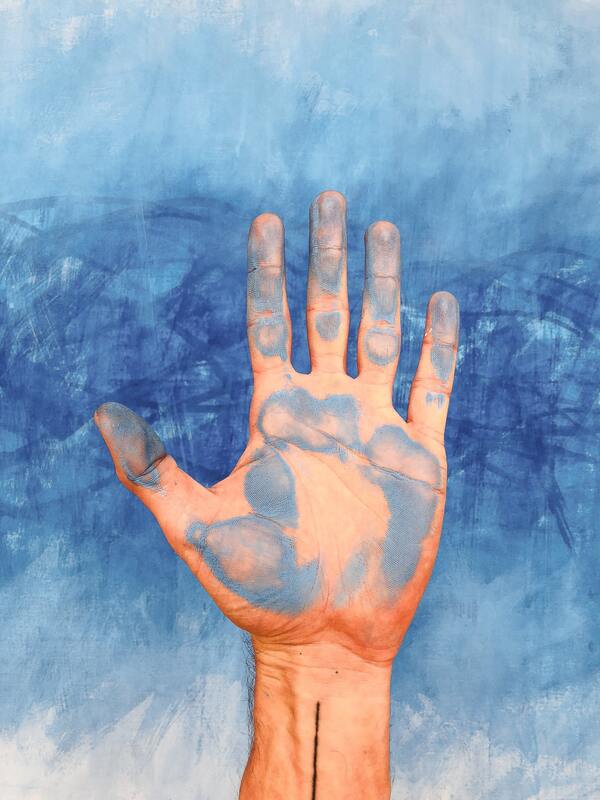|
As was our custom, I started class by telling “Ant and Elephant,” a world tale from India. The story begins with the animals naming Elephant as King. Once named, the previously gentle animal becomes a bully. Because he is so big, none of the animals dare to challenge him. Only Ant, the smallest animal figures out how to solve the problem. Everyone in class had a minute to fingerpaint an image of ingenuity. When a student, I’ll call him Jeff, showed his image, the class and I gasped. Normally, I never commented on students’ images but time and again Jeff’s images were so brilliant that this time I couldn’t help myself. Neither could the rest of the class. “How did you do that in one minute?” asked a student? Jeff shrugged. “You’re an artist,” exclaimed another. The class murmured their agreement. Jeff shrugged again, and again, deflecting all compliments. It felt as if the more they complimented him the smaller he got.
I had noticed his images becoming darker and his words more bleak as the semester progressed. Now I worried about Jeff’s inability to take in the feedback offered by the class. In the past, I’d often thought I needed to say something about what I saw, but held back. I live with inner darkness. I have to be careful not to impose what I see and feel on someone else. I don’t always trust my perception. And yet, each time someone called him an artist Jeff became more agitated. Something was definitely wrong. I asked to speak with him in my office after class. “I can’t,” he said, “I’m busy.” “Whatever you have to do can wait. We need to talk.” When he told me he had to go, I told him we could talk outside. The more he resisted, the more certain I was I needed to talk with him. As a professor I have a certain amount of authority and I used every bit of it. “Let’s sit on that bench. Now!” I didn’t mince words. “Why did you get so upset when the class called you an artist.?” Jeff stared at the grass, watching an ant carry a crumb twice its size. “If Ant could tame Elephant, why can’t you be an artist?” One thing didn’t really have anything to do with the other but it was all I could think of. It took him a while to respond. “I used to draw a lot when I was little. My father always made fun of me. It got so bad I just stopped showing him what I drew and painted. When I came to the university I wanted to study art but he told me the only major he’d support was engineering. He says he won’t pay for my “doodling,” as he calls it. I just can’t do it anymore. Life isn’t worth living.” He refused to look at me. “Your father is wrong. You are an artist. You have the right to do what you love.” Jeff shrugged. I recognize feelings of hopeless/helpless, knowing only too well how debilitating they can be. ”Look,” I said, “if your father is so worried about you not being able to support yourself once you have your degree, tell him you’ll sign a contract promising not to ask him for any money after you graduate.” Jeff laughed bitterly. I felt increasingly desperate. “Take back your life, Jeff. If your father won’t pay for your studies, apply for a scholarship. You have talent. You’re smart. Let me help you. Please!” Jeff stopped watching the ant and looked at me. “Why do you care? What’s one student more or less?” “Every student matters to me. Why don’t you matter to you?” He shrugged. I could feel my frustration and desperation rising, especially when he brushed aside my suggestion that he go to the Counseling Center. “Jeff, if you’re so determined that the life you’re living isn’t worth living, why not do what you want? Change your major to art. Take control of your life. I’ll help in any way I can. So will the art faculty.” “What about my father?” “What about your mother? Won’t she help?” “She does what my father tells her to do.” “Maybe standing up for yourself will impress your father and he’ll agree to pay for your studies, but if he won’t, it’s not the end. Your tuition is paid for the rest of the year. You have time to apply for scholarships and work study.” Jeff stared at me. I met his gaze. I could feel his struggling. “Tell me one reason my life is worth living.” I normally never talk about my life, but it was all I knew to do. “If I tell you something, will you keep it to yourself?” He nodded. “I grew up with abuse—physical, sexual, emotional—I was told I was stupid, unlovable, clumsy . . . I believed what I heard. I thought I deserved to be abused. I tried to kill myself several times—obviously unsuccessful. I know about despair.” “But you’re a college professor. You have a PhD. You teach courses no one else does. You care about imagination and creativity. What happened?” “I kept going, like a horse with blinders, one foot in front of the other. I became a teacher. I create a class where students feel safe and can flourish. And now, here I am, a professor in the Honors Program, teaching the brightest students in the university, like you. What I was told was wrong. What your father told you is wrong. He has money, but you have power. Use it!” ******* Jeff changed his major. His father disowned him. He qualified for financial aid, work/study and scholarships. He graduated summa cum laude, majoring in art.
0 Comments
It was the summer I turned nineteen, between the end of my junior year in college, before the beginning of my senior year. I was hired as a summer recreational therapist in charge of a building of about 300 women, part of a mental hospital with over 6,000 patients. I took the job because the salary, $60.00 a week, was a whole lot more than I could earn as a camp counselor. Besides, the job description: take patients out, play games with them, bring them all back safely, sounded simple. How hard could it be? I’d been playing softball since I could hold a bat. Although I thought I’d be given orientation, training—what I got was a metal chain around my waist with more keys of differing sizes and shapes than I’d ever seen, and then sent to the building where I was to work.
Terrified by the strange sounds and smells, I walked up to the ward to meet my patients. I stared at the women—lolling, muttering, drooling, talking to people who weren’t listening. A woman zoomed toward me, only to stop a few inches from my nose, then zoom toward someone else. Another woman, with piercing blue eyes strode up to me and asked in a menacing voice, “What are you doing here?” Too scared to lie I said, “I haven’t a clue.” She laughed. “Well at least you’re honest. Maybe you’ll last longer than the other one.” Who was the other one I wondered, too afraid to ask. More women gathered around me asking questions, demanding I help them immediately. Soon it seemed the whole ward was pushing against me, wanting, needed, wishing, hoping. It was too much. I decided to leave, only the women were blocking the door. A large, stout women with a curt voice cut through the chaos. She looked at my name tag. “Miss Rubin, you are here to help patients, not upset them. If you can’t do better, I will recommend your termination.” Part of me was relieved—maybe I could get a job I knew how to do—but part of me was offended. How was I supposed to know how to interact with patients with no training? As the attendant in charge yelled at me, the women silently disappeared. “Your job is to take patients out for recreation. I suggest you focus on what you have been hired to do.” It took all the courage I had to respond. “Please tell me how to take the women out?” “Don’t you know anything?” she snarled. I felt like saying, “No, I don’t.” Without waiting for my answer, she yelled, “Ladies, if you want to go out with Miss Rubin, line up at the door.” After assigning one of the ward attendants to come with me, she spoke in a scathing voice, “Miss Rubin, you will return the same number of patients you take out. Is that clear?” I nodded. About fifteen women lined up. I started down the stairs. The attendant at the back, a prune-faced woman who looked like her last meal had been months ago, scowled and spit out, “Miss Rubin, slow down!” I realized I had to move much more slowly if I wanted the women to keep up with me. I felt as if I were leading a funeral procession. Mine? Walking so slowly, even down steps, gave me time to think. Since I knew nothing about mental illness, I made a quick decision to treat everyone as if they were mentally healthy, whatever that meant. When we finally got to the ball field the sun was strong and there was no shade. With the temperature and humidity in the 90’s, I couldn’t imagine making women much older than me run around a baseball field or play any kind of game in such heat. I told them I thought it was too hot to run around, and asked if they’d like to hear a story. They wanted to know what kind. “A Once Upon a Time story,” I said. Although that seemed to sound good to them, the attendant sniped, “Miss Rubin, you’re supposed to play games with the patients, not tell stories.” With every criticism of me she seemed more pleased with herself. I couldn’t stand her self-righteousness. Besides, technically I had a higher rank that she did. Trying to hide my annoyance, I ignored the attendant and asked the women what they preferred. A few of them cried out, “We want to hear your story.” They were acting normal in my opinion, and normal was what I could deal with. “Okay, let’s go sit under that tree.” They followed me to a large oak where we sat in the shade on grass. They settled themselves amicably and I began, making up the story as I went along, in no hurry, happy to ignore the attendant’s scowl. Suddenly a man in a dark suit, surrounded by two men in suits, approached, looked at my name tag and bellowed: “Miss Rubin, you’re supposed to be playing games not telling stories. Get your group up and start moving!” I was flabbergasted. The attendant hid behind the tree; the women began crying and mewling and cursing and apologizing. Everyone was upset. I didn’t know who the man was but the women did—they whispered—he was the director of the hospital, my boss. I stood up. The women followed. I walked a few steps as slowly as I could, then stopped. It was even hotter than when we’d first left the ward. When the men were out of sight I turned to the women and asked, “Would you like to go back and listen to a story?” Silence. Fear. Anxiety. The attendant smirked. “You heard what he said. We need to play games.” I felt like throttling her. Then the women began to speak: “Will we get in trouble?” “He’s a bad man.” Why does he need to shout?” “It’s too hot to run.” “What’s wrong with that man?” “He’s a man, what does he know?” Emboldened, they continued offering their thoughts. Yes. No. Maybe. I sighed. If I got fired I might still have time to apply for a job at a summer camp. Although I probably felt as anxious as the women, I told them not to worry, I would take responsibility for choosing to tell stories sitting in the shade rather than running around in the heat. One of the women astonished me by saying, “This is a perfectly responsible decision. That man should know better.” Some of the women voiced their agreement. None objected. Despite the attendant’s vocal disapproval, I led the women back to the tree, we settled ourselves down, and I began, “Once upon a time . . .” What would you have done? I didn’t want to go to sleepaway camp. It didn’t sound good despite my father telling me I would love it. When I asked him what I would love he told me he wished he’d been able to go to camp. Even at 7 I knew that wasn’t an answer, but when he didn’t want to answer a question there was no point in asking again. I didn’t want to leave my baby sister. I didn’t want to be sent away from home again, but I had no choice. My mother had spent nights sewing labels with my name on my clothes. One morning she packed my suitcase, made a picnic lunch, and told me to get into the car. When I hesitated, she said that if I didn’t get in the car, “right now!” she’d give me something to get me going. I knew that meant trouble. I got in the car.
My mother was angry that she had to drive such a long drive by herself, angry when I wouldn’t eat, angry when she had to stop so I could use a bathroom. By the time we got to camp, she was furious and I felt sick. She told me I should appreciate how lucky I was, that I should be grateful, not a spoiled brat, that she’d never had such a wonderful opportunity to spend a summer in the country and be out of the hot city. She deposited me with a counselor and left. I was only seven, but I’d been put in a bunk with nine-year-olds. The counselor told me to take off my dress and put on shorts and a tee shirt. I didn’t want to wear shorts. I didn’t want to take off my dress. She said I had to; it was the rules. “Who made the rules?” I asked, but she just ignored me. When the counselor wasn’t looking the kids in the bunk made fun of me. They called me Titsucker, and Babysnot, refusing to call me by my name. I knew I was too young to be with them, but I didn’t ask to be in their bunk. When they kept telling me I didn’t belong, I silently agreed with them, but where was I supposed to go? When it was time for supper the smell of the food made me sick. I ran out of the dining room, gasping for air, hoping I wouldn’t throw up before I got out. The counselor followed me, told me to come back in, to sit at the table like the others. She could make me sit but she couldn’t make me eat. After supper we gathered around a fire to roast marshmallows. There were too many kids huddled around the fire and no one made space for me so I sat on a log and watched, slapping mosquitos, wishing I could leave. The next morning my dress was gone. I put on the shorts and tee shirt and went to the infirmary. I told the nurse I didn’t feel good. She checked me out and said there was nothing wrong, that I was just homesick. I didn’t tell her I was campsick. No matter what I said, she insisted I was fine, that I should go to the arts and craft shack to join my group. Since she was no help, I decided to run away. The only place I could think to go was the forest. When no one was looking, I ran as fast as I could, into the forest at the edge of the camp. The cool air, smelling of earth and wildflowers and grasses comforted me. I felt better. Then I saw a boy, a little older than me, a little taller than me, but friendly. He smiled. “I’m Peter. What are you doing here?” I told Peter I hated camp and my counselor and the girls in my bunk. He told me he loved the forest, did I want him to tell me the names of trees and flowers and birds that he knew? I nodded. He took my hand and we walked into the woods, stopping when he showed me a wildflower hidden near a fallen log, a baby oak tree, a bird’s nest. I forgot about hate and sick. I forgot about the counselor and the girls in my bunk. I wanted to stay in the forest with Peter until it was time to go home at the end of the summer. Peter looked at his watch. “We need to go back now; otherwise they’ll start looking for us. He smiled and said, “Don’t worry. I’ll meet you here tomorrow, same time. Okay?” I nodded. “Just make sure no one sees you leaving the forest.” I promised to be careful. The next day and the next day and the next day Peter and I met in the forest. I learned the names of trees and flowers and birds. But one morning, as we were leaving the forest, his counselor and my counselor caught us. They were furious. “We’ve been looking all over for you. We were worried something happened to you. Don’t you care about anyone besides yourselves?” Peter said he was sorry as he walked off with his counselor. I wasn’t sorry about being in the forest. I was sorry about being caught. My counselor tried to take my hand but I wouldn’t let her. I didn’t believe for one minute she cared about me and I didn’t care about her. She was mean. The next morning, after breakfast, when no one was looking, I ran into the forest. The forest was my friend. I wished Peter was in the forest with me but still, I felt free and happy. I found a path and walked on it. Maybe it would lead to a little house in the forest where I could live until the end of the summer. After walking for a long time, I felt tired and sat down on a soft green mossy mound. I leaned against a huge oak tree and closed my eyes. I imagined the kind people who lived in the house and how they would make food I liked to eat. Suddenly there was a lot of noise. Someone yelled, “There she is! We found her!” A lot of people rushed toward me. I tried to run but a woman knelt beside me and put her arm around me. I tried to pull away but she held me tight. “I’m Marty, the nature counselor.” I didn’t know what that was. She told me she liked to study trees and wildflowers and birds. That sounded nice. “Would you like to be my assistant?” she asked. “You could come to the nature shack and help me out.” “For how long?” I asked. Maybe it would only be for one morning and then everything would be terrible again. “You can stay with me for as long as you like, but you have to promise you won’t run away any more.” I nodded but she said she had to hear the words. I didn’t want to say them. Even though she seemed kind, maybe my counselor wouldn’t let me stay with her. The best I could do was say, “I’ll try.” She looked like she was studying me. “Okay,” she said after I wouldn’t promise. “I guess that’s good enough for now. Let’s go, it’s almost time for lunch.” We started walking back to camp. She took my hand and wrapped hers around mine. I let her. Did you ever run away? |
Monthly StoriesStories inspired by world tales to challenge and comfort. Archives
July 2024
Categories |
Copyright © Nancy King 2020 | Site Design by Angulo Marketing & Design
|
|
Nancy King is a widely published author and a professor emerita at the University of Delaware, where she has taught theater, drama, playwriting, creative writing, and multidisciplinary studies with an emphasis on world literature. She has published seven previous works of nonfiction and five novels. Her new memoir, Breaking the Silence, explores the power of stories in healing from trauma and abuse. Her career has emphasized the use of her own experience in being silenced to encourage students to find their voices and to express their thoughts, feelings, and experiences with authenticity, as a way to add meaning to their lives.
|




 RSS Feed
RSS Feed